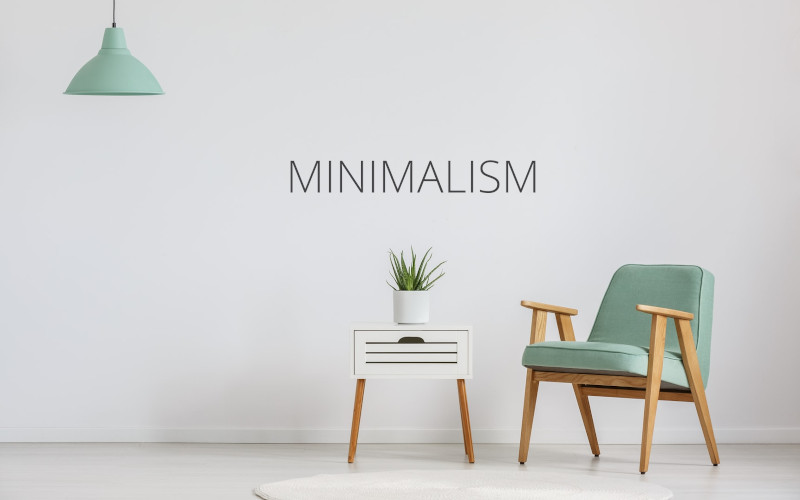Minimalism is a way of life, a philosophy. Being minimalist is lifestyle, an election. Minimalism is a lifestyle. It's something you have to experience on your own life to fall in love with him. Discover these 10 keys and tips to be it.

Have you ever considered that you have too many things, too many commitments and
too many worries and obligations in your head?
Would you like everything to be easier but you don't know where to start?
Be minimalist. You will notice the difference.
Maybe this minimalism sounds like living under a bridge with a backpack in the one that you only keep 4 things. But no, minimalism is much more than that, it is a lifestyle, a philosophy.
It consists of focusing on what is really important to you and eliminating everything else
of your life.
Knowing what is important, what is essential for you and choosing to be left alone with that,
it gives a clarity and an inner tranquility that you cannot imagine, in addition to many others
benefits.
The opposite of being minimalist is being a person who tends to accumulate things, to be
lazy, to procrastinate. To be more disordered both with things, and in life in
general and thoughts.
Minimalism is simple, but it is not easy to achieve.
It requires a deep self-analysis and an important emotional detachment exercise, but I assure you it is worth it.
It gives you clarity, order, and focus so you can focus on what's really important to
you. In this way it is much easier to get what you want, since you do not have unnecessary distractions.
If you do not know where to start, today we are going to explain some of the keys that
we apply to lead a minimalist lifestyle and be focused on what we really want.
1. Minimalism: Eliminate everything you don't need
Are you one of those who have a storage room with all the books of the Institute, with all the clothes
from another season and with toys from years ago? Have you ever wondered why you want everything
that in 20 years?
Storing is useless. It just takes up space and takes away your freedom.
If you want to move house, what are you going to do with all those things?
Holding on to material things is a form of slavery.
Without realizing it you are wasting a lot of time searching, cleaning and maintaining all those things. Believe it or not, your things catch you and prevent you from moving forward and to get better.
For example imagining if we have been traveling 3 months in Asia. A suitcase, laptop, photo and video cameras, passport and little else. We realize that we don't need so much to live, to enjoy, to have experiences and to do what we really like.
Look at your room, your closets and drawers, and your house. Start checking and classify the things you have, and ask yourself :
Do I really need it ? Have i used it last year? If the answer is no, get rid of it.
We are not talking about throwing away, there are many alternatives. For example, you can donate them. You will feel better knowing that someone is taking advantage of what was just a burden to you.
Or you can sell clothes or old things that are in good condition and you will get an extra money.
2. Minimalist: Don't get attached to objects
In the cases where you are sorry to throw things away because you are fond of them, think that it is not really that object itself that you love, but the memories that you bring.
Take a photo if you have a hard time getting rid of it but do not stick to the material to
stay clinging to the past.
The memories are in you, not in things.
Live in the present and look to the future, not the past.
3. Minimalism: Order and simplicity at home
Don't complicate your life, value simplicity.
Turn everything around you into something easy to manage.
Think that each object you have must have a specific use and make each one occupy the its rightful place.
In this way it will be easier to always be tidy and you will find things much more quick.
4. Minimalist, Control your purchases
Once you've done cleaning and you're left with what you really use, you're welcome it will work if you then buy again compulsively since you will be in the same point.
Try to apply the rule of "one thing goes in, something else comes out", so every time you buy
something you will have to get rid of something else.
Of course there will be exceptions, but this is very easy to apply especially to clothing.
For example, when you want to buy a new shirt, think of the one with the most
old, in which you hardly use it anymore and sell it or donate it.
In this way you will avoid accumulating again and you will become more selective with your purchases
really thinking about the use that you are going to give that object.
5. Digitize everything you can
A good trick to get rid of some things that are not clear to you is to scan them or take a picture of them first.
For example you can take photos of documents, invoices, tickets, letters and save everything in a folder on your computer.
Is there an object that brings back memories and makes you sad to throw?
Take a photo, write the memories and feelings it brings you and you will have it at hand in your computer whenever you want.
6. Simplify Technology
Do not accumulate devices. Have the righteous you need, if possible, that serve to several things at once.
For example, do you need an mp3, an ipod, a mobile phone?
Maybe not, maybe only with your mobile phone you can do everything you really need and
you will be saving money that you can use, for example, to save money to go for a trip.
On your computer, also be minimal with your files.
Don't have digital diogenes syndrome keeping everything you don't need "just in case perhaps".
The desktop, the folders, your email ... keep what is important and you will have everything more
orderly and controlled.
7. Control and decrease the consumption of information
Sometimes we don't realize it and spend the day exposed to a lot of information and distractions that do not contribute anything and make us lose time and focus.
Decrease the time of television, social networks and mobile phone and you will notice the difference.
Try to focus on what you really want to achieve in your day to day and not so much in "be informed".
8. Value your time and select your commitments
Learn to value your time, to be more productive and above all to say "no". Your time is very valuable so take advantage of it. Don't set too many goals or projects at a time since this way you will lose concentration.
Although we have many ideas and projects in mind, we try to focus on only 2 or 3 important at a time and that helps us to advance faster.
Also do not do things out of obligation or commitment, if you always try to please everyone, you will be leaving the door open for them to take advantage of you.
Be true to yourself and learn to say "no" assertively without the other person
have to be offended.
Be true to yourself and learn to say NO assertively.
9. Choose to accumulate Experiences instead of things
Focus your life on experiences, relationships and the things they do to you learn and improve.
Try, experiment, travel and live intensely. It is the only way to get to know yourself better and feel fulfilled.
Have things to tell, teach and share when you are old and not just objects accumulated.
10. Control your mind
If you are always thinking and turning things around, creating problems that do not exist or thinking of the past, that is not minimalism.
We have said that you have to focus on what is really important to you, and what it has happened or what you still do not know if it will happen is not worth your concern.
Learn to meditate to be calmer, more present and find the emotional balance.
In summary:
Focus on what's important and eliminate everything else in your life.
Learn to live in the present, to enjoy the little things.
To do things that you like, that they contribute to you and to say no to the rest.
Simplify and your life will be much simpler and fuller.
A minimalist life.


















































 Philippine Peso Exchange Rate
Philippine Peso Exchange Rate






